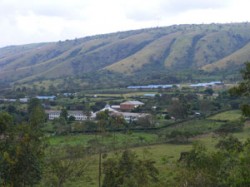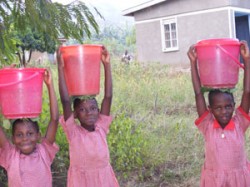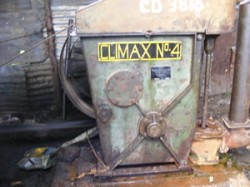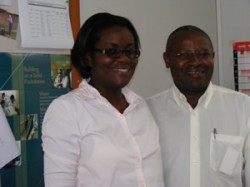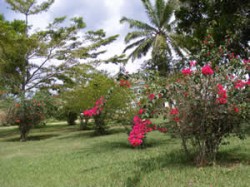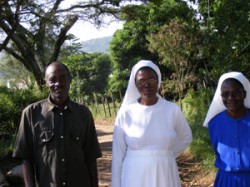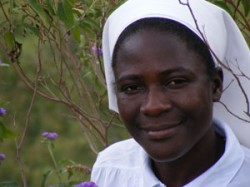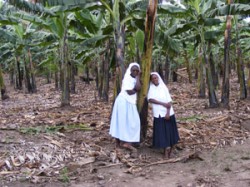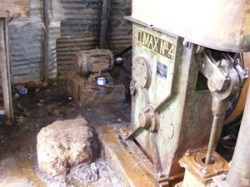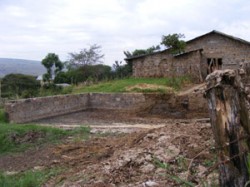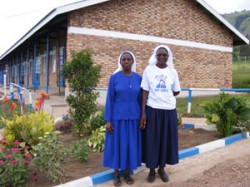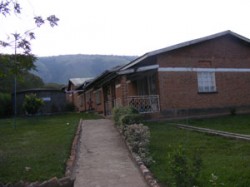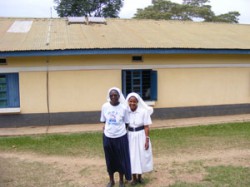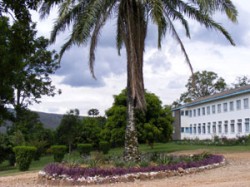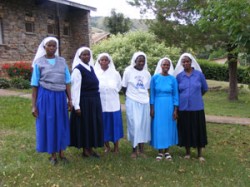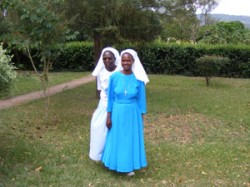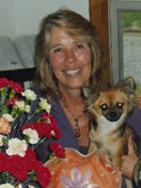My Story
Roger Ethier
Copyright July, 2008
“My Story” tells of the author’s visit to the Kyabirukwa Convent and Farm located in South Western Uganda for three weeks in June 2008 as a Technical Specialist…tells of the warmth and kindness that he finds there among the children and the Sisters of our Lady of Good Counsel in what the author describes as “one of the most heart searing episodes in my life”.
Beginning of Author’s Final Report
“The Kyabirukwa Convent and Farm in Southwest Uganda is in critical need of resources. The pressures from an expanded population of children over the last five years at the Primary and Secondary Boarding Schools and the Hospital has placed severe stress on the water supplies, the power system and the sewer systems. The population in the three schools and hospital is expected to double again in two to three years. Additionally, after privatization that was mandated by presidential decree the milk cooperative that buys from the Convent Farm was unable to pay its milk bill reliably, and payments for milk are six months overdue. As an alternative the farm manager believes a Convent-on-site-Milk Parlor to process cheese and yogurt is needed that will supply these products to the children in the schools, the patients in the Health Care Center and the people in the surrounding communities. Also since power for the Milk Parlor refrigerators is unreliable a Biogas Digester using cow manure as a feed source with a 5KW generator has been designed and is highly recommended.”
Thus began my final report for The Kyabirukwa Convent and Farm, Uganda. June 1 - June 23, 2008
Uganda, its people, my trip and arrival
“The Pearl of Africa” Winston Churchill called Uganda for its magnificence, variety of form and color, for profusion of brilliant life – plant, bird, insect reptile, beast – for its vast scale. … and I will add for its beautiful, loving people. From the first day you arrive they wrap their hearts around yours and you are at once a captive to their grace and their kindness. These are my thoughts leaving Kampala, Uganda after three weeks on this overcast evening as our flight lifts off the apron, circles the Capital once and heads northwest to my home in Shepherdstown, West Virginia, USA. But I am getting ahead of my story. To tell the whole story, I need to start at the beginning.
“Your baggage, what little is of it there is, is in the car”, Suwahlu is saying while chiding me on my two small bags. She slams the back door on her Toyota Wagon shut.”Only two small bags for a three week trip. Unbelievable!”
Startled, I look up to see the smiling face of my very good friend holding the passenger door open, waiting for me to enter.
“Where did you come from? I never heard you drive up”.
“Your mind is already in Uganda”, my laughing friend replies as we fasten our seat belts. She turns her car around, heads down a half mile gravel road and turns right at the end of the driveway onto Route 9, a major highway into Northern Virginia.
“Suwahlu, you are right on time! You are special. Another chuckle from her before everything quiets to the tune of a motor humming its song.
My thoughts are truly far from Shepherdstown, West Virginia, my home this morning. Twenty two hours from the time that my flight will take off this afternoon I will arrive in Kampala, Uganda, East Africa. Since it will be nighttime, I will spend the first night in a hotel in Kampala and then in the morning after a four hour motor car ride I will arrive at Kyabirukwa Convent and Farm in southwestern Uganda to begin, unknown to me what will be one of the most heart searing episodes in my life. I will find at Kyabirukwa all of the utilities badly stressed, the sewer systems, the power system, and in particular the water systems. In the summer months where there can be up to 90 consecutive days without rainfall there would be only a two day supply of water for a health care center that uses 5000 liters/day. The rest of the water will be hand carried daily from the polluted rivers and boiled. Incredibly, even the main water pump on the farm that supplies water to 100 head of cattle, the rest of the farm, and the Convent and the Schools will fail and take nearly a week to repair. The main well casings that had been in the ground over forty years had cracked and leaked the water out of the well and into the surrounding ground.
The initial call came in mid afternoon sometime in early May as a request for me to look at an email from Uganda involving the US AID Farmer-to-Farmer Program. “There is a Convent Farm in the Southwest that is asking for assistance in Biogas Digestion, one of your specialties. I’m not sure if it makes any sense or not so if I forward the email would you mind taking a look at it… and let me know what you think.” Sure Dianna, be glad to.”
My travels to small villages inside Africa had not yet taken me to Uganda. If you believe what you read in newspapers and what you listen to on the radio you may never visit Africa because of the reported violence throughout most of the continent. But during the last 20 plus years while visiting 26 different countries threats of violence have never deterred me, nor have I ever been threatened. And so when the call came from Uganda that there was a need for assistance to determine the feasibility of a Biogas Digester that used cow manure as a feed source to generate methane I did not hesitate. The methane would power an electric generator to supply power for refrigeration in a new dairy parlor that needed to be built and that would produce cheese and yogurt that could be sold at the farm and to surrounding communities.
The sole cooperative in the region that bought the milk from the Convent Farm had been unable to pay its bills for six months and the money from the milk was a prime source of revenue to keep the farm in operation. The farm manager had therefore decided to build a milk parlor and start to process their own dairy products. Also, because I was going to be on-site for three weeks, I insisted that I also assess the water supply, sewer systems and the power for the Convent Farm, something I am very adept at and to supply recommendations and designs for improvements where I thought necessary. Everyone at the Convent Farm agreed.
Robert Gensi, a native who has worked as a Program Manager for ACDI/VOCA, a worldwide NGO for the last nine years in Uganda showed up promptly at 9 AM and we were off immediately. Robert is a very amiable chap and very knowledgeable of Uganda and its people. He is also very tolerant of non natives like me so we got on quite well from the beginning. The roads were good and traffic although heavy at times was manageable. We stopped for 2 bunches of midget bananas along the road and when we were close by Mbarara, a town about 40 miles from the Convent Farm we stopped for lunch and cold water. The weather was cool despite the fact that Uganda straddles the Equator. The breezes and coolness are the result of the mountains and valleys, much the same as West Virginia. Altitude is also a factor since most of Uganda which is landlocked is situated on a high plateau 1000 meters above sea level. Therefore where West Virginia’s humidity is high due to its relatively low altitude, in Uganda the humidity averages around 70% and days are pleasant and nights comfortably cool.
The Kyabirukwa Convent Farm is impressive, particularly the entrance to the Convent and Chapel. Shrubs and trees are spaced out over an expansive lawn that is well maintained by the Sisters and the road ends in a loop where people embark from cars for easy access to the Convent, Novitiate and Chapel. Sister Cleophos was waiting at the drop-off and Robert leisurely waved to her as we approached. Sister Cleophos warmly returned his gesture. Robert introduced us and Sister said, “we have been expecting you and we are so glad that you are here”. I returned her kind welcome and she replied “Let’s drop your baggage here at your room and then we’ll walk to our house for tea”. However, when I dragged out my two small bags she too was astounded.
“Is that all you have? Unbelievable! I don’t need much, I replied and I thought back to Sunday morning when Suwahlu had the same reaction in the very same words although both women live half a world apart.
We walked to her house with Sister easily chatting and Robert and she joking with each other. Sister was dressed in her full habit and only her face was not covered, yet her easy manner, her quick laughs and sense of self worth and happiness reminded me of someone that I knew but wasn’t immediately able to place.
At her house that she shares with four other Sisters for breakfast, lunch and dinner Robert and I accepted Sister Cleophos offer for tea and as we sipped tea laced with milk she gave us an overview of Kyabirukwa. “We not only have a Convent and Farm here but we also have two schools , a primary and a secondary with 400 students boarding in each, a level three health care center with one hundred beds, a vocational school and a novitiate. We serve our own community, and the local communities surrounding the farm as far as Mbabara and south into border communities in nearby Tanzania and Rwanda”.
“We are the Sisters of our Lady of Good Counsel that originates in French Canada and is a worldwide organization. We are of service to everyone, particularly the Lowly Humankind and Poor People of Society which is our charter. This farm was built in the early 1960s. It was very beautiful then but in 1979 an invading army set up their headquarters here on the farm and slaughtered 300 head of our cattle for food for their troops. The sisters had to run for their lives. Finally the army left and when we returned we found that the entire farm had been ransacked. Buildings were disassembled and taken away and everything that was not bolted down was removed. Even the tin roofs were hauled away and were replaced with used tin. When you go to the barns tomorrow you will see nail holes in the roof. The tin in the barns is reused from previous buildings and filled with nail holes. Ever since 1979 we have been rebuilding.
However in the last two years our population in the schools and hospital has nearly doubled which is causing power, water and sewer problems. Recently the flush toilets in the hospital have been shut down because of lack of water and they were replaced by pit toilets. But Roger, you will see all these things and more for yourself tomorrow. Sister Goretti here will escort you wherever you want to go. If you have questions or need anything, please ask her. She will be happy to assist”.
Indeed the next morning at 7AM Sister Gorreti was at my door to escort me back to the Sisters’ House for breakfast. I ate three pieces of toast and honey taken from the bee hives on the farm while I met Sisters Elizabeth, Richard, Florence, and Felegita. Sister Cleophas was already there and together we all chatted briefly before Sister Gorietti and I left to begin my initial tour of Kyabirukwa. These were the Sisters that worked at the Farm and some of them had advanced degrees in Agriculture. Sister Cleophas was scheduled to take her test for Masters in Agriculture in late June, shortly after I left.
The Survey
The Farm
The Farm includes the dairy barns and 100 head of cattle, pastures and a banana plantation. In addition to supplying water to the convent and 100 head of cattle a central water pump distributes water to the novitiate, various buildings throughout the complex, and the vegetable, fruit and flower gardens.
Unfortunately the water pumping system at the farm is antiquated and very costly to maintain and operate. In the last few years it has also become unreliable and needs to be replaced with a modern, in-line pumping system as soon as possible. This is an emergency requirement and one of two of the most critical in a situation that is filled with emergency requirements. During pump installation, the well recharge rate itself needs to be evaluated and if acceptable then matched to an efficient, modern, state of the art water pump. If the recharge rate is not acceptable the well itself will need to be re-drilled to a deeper depth.
Likewise the immediate conversion of part of a garage that is adjacent to the milk collection building to a dairy processing parlor to manufacture cheese and yogurt is an equally critical requirement. Conversion will require both reconstruction of a room within the garage to process the dairy products, and new construction of an Anaerobic Digester to generate reliable electricity for refrigeration. Both are not complex tasks although construction of the Anaerobic Digester requires outside expertise. However, already in Western Uganda there is an operational Anaerobic Digester that is used for heating and lighting and therefore some expertise is already available in-country. Approximately 40 gallons of cow manure can be collected daily and used as a feed source for the Digester which is more than an ample supply of feedstock to supply methane gas for a 5 KW generator.
The Primary and Secondary Schools
The Primary and Secondary Schools are each a cluster of brick buildings that are perhaps ten years old. Rain gutters along the edges of roofs are prominent on some of the buildings as are water tanks where the collected water from the gutters is stored. However many of the buildings do not have rain collection gutters and storage tanks and are therefore not part of the water collection system. Ten years ago it was impossible to forecast the explosive expansion of student enrollment and subsequent demand for water at the schools.
Obviously the first task at the schools is to expand the roof water collection system to all the buildings of the complex and to construct sufficient water storage capacity to handle all of the projected increase in volume of water. The calculations are relatively simple and show that sufficient volume of water would be available to supply the projected 750 student enrollment at each school in two years with sufficient water, including for 18 flush toilets. Therefore, the tasks for both schools are similar, to expand the water collection and storage systems and install flush toilets with supporting septic systems.
Also, within each of the classrooms four electrical lights supply illumination. However frequent power outages cause class rooms to become dark during evenings and unusable. In order for students to be able to study and read at night another alternative needs to be found and solar powered lights with batteries is the obvious solution. It is believed that 4 hours of illumination each night from solar cells and batteries approximately 50 percent of the time is sufficient to supplement the existing electrical system in order to enable students to read and study during night time hours.
The Health Care Level 3 Facility
At the Health Care Level 3 Facility water is critically short and all five buildings need rain collection gutters and water storage systems vastly expanded in order to satisfy the demand of 5000 liters/day. Also a well needs to be drilled to allow the Health Care Facility an independent supply of potable water. Flush toilets that are currently shut down due to water shortage need to be reactivated as soon as the expanded water collection and supporting sewer systems are installed. Lights in many of the rooms need to be expanded with photovoltaic lighting systems with batteries in order to supply an adequate amount of illumination. Today less than a two day supply of water is available at the Healthcare Facility in area that can have up to 90 consecutive days without rainfall. The rest of the demand for water is satisfied by transporting water from contaminated rivers outside Kyabirukwa to the Health Care Level 3 Complex where it is treated.
Novitiate, Convent and Rectory
Likewise, the problems with water supply, sewerage and power at the Convent, Novitiate, and Rectory are similar to those of the Schools and at the Health Care Level 3 Facility and the solutions are similar. Also, a new Vocational School is being built and extension of the power utility line will cost over $10,000. That money appears to be better spent on a Photovoltaic Lighting Systems. Up-front costs are marginally greater for the solar systems but in the long-range operational costs will be considerably smaller. Additional resources are also needed to construct the new buildings some of which already have been professionally designed and a commitment needs to be made by future designers to incorporate an expanded water collection and storage system into all new buildings.
All of these projects were carefully documented and discussed with the Faculty and Management. The technical details and costs are detailed on the website donortable.org, a fully owned website of Engineers Without Borders International, of Shepherdstown, WV that is actively soliciting donors for resources to upgrade facilities at Kyabirukwa. Other notable upgrades include computers, (there are none at at Kyabirukwa), keyboards for introduction of music to the curriculums (there are none at Kyabirukwa), an allotment of $15/semester for personal care products for novices with insufficient resources, a silage chopper (manual) to facilitate the collection of elephant grass for the cattle (there are none at Kyabirukwa), sewing and knitting machines for the new Vocational School, and a small automobile for emergency and miscellaneous transportation of faculty and students.
Relationships
Angels and Guardian Angels
For three weeks while at Kyabirukwa Convent and Farm the Sisters of Our Lady of Good Counsel and I shared breakfast, lunch and dinner, and worked very closely with each other. I lived at the convent and shared a bathroom. Sister Goretti assisted me when meeting and coordinating with the other Sisters who were in charge of each of the Schools and the Health Care Level 3 Facility and Sister Elizabeth assisted her when escorting me from late dinner at the convent back to my room, a walk of approximately 15 minutes. In their words they were concerned that I might be attacked by “the dogs at the farm and snakes that were in the grass”. We talked, joked and laughed during our walks and I often called them my Guardian Angels. Likewise, I often referred to all the Sisters at dinner as Angels and I feel honored and grateful to know all of them and to have been fully accepted as part of their community.
Among her many duties Sister Elizabeth was the primary cook and often Sister Goretti assisted her with meals that were wholesome, tasty and generous. There were steamed green bananas, many kinds of soups including delicious nut soup, many vegetables all grown on the farm, home grown chicken and other meats that reminded me of the healthy, wholesome food of my childhood.
By far the largest segment of my time I spent with Sister Cleophos, the Farm Manager who is a joy despite her many stressful duties. When the primary water pump at Kyabirukwa failed, at dinner that evening I whispered to her to stay in the present, not to worry about the past or future and I saw her relax immediately. She knew exactly what I was talking about and in the morning at breakfast she mentioned to the other Sisters what I had said and that it had worked. She said that she slept very well that night.
I departed from my home in USA to Uganda on June 1st, my birthday. Suwahlu, my special friend had given me a portable CD player complete with very good ear phones and 8 CDs of her favorite music as a gift, including Chapel Music she often played during our Sunday Meeting Times at the Lord’s Chapel in Winchester Va where we meet to experience ourselves and God. The Lord’s Chapel is an Interfaith Chapel where all Spiritual Paths are welcome. The Sisters enjoyed listening to the exquisite violin, piano, and steel guitar music occasionally accompanied by a soprano and I often saw them close their eyes and quietly sway and lightly dance in circles to the waltzes while holding the portable player and wearing ear phones. Sometime very soon Suwahlu and I will put together a similar package of a CD player with earphones and speakers, and the same CD disks as a gift to them of our appreciation for their work, their kindness and their warmth and Suwahlu’s gratitude for keeping me protected and returning me safely home.
One evening after dinner as a guest at the Novitiate I watched the shy children, many of whom had been orphaned by diseases and plagues hold hands in a circle and sing along with the Chapel Music from one of the CDs, singing louder and louder at the top of their voices, and continue to sing long after the batteries on the CD that was connected to a small set of speakers had failed. I had asked my two Guardian Angels to select two songs for the children to sing after dinner and they chose the Face of God and How Could Anyone Ever Tell You, You Are Anything But Beautiful.
The children started very softly at first singing to the words and tune of The Face of God. When Sister Goretti played the second song the children who were well warmed-up by then sang at first softly until they got the words down pat. Then from the tops of their voices, and for a minimum of 30 minutes all of the shy children and my two Guardian Angels blasted out the words over and over as I watched them sing with noses pointed to the heavens, hands locked in a chain, swaying back and forth and singing from deep inside their hearts.
How could anyone ever tell you, you are anything less than beautiful?
How could anyone ever tell you, you are anything less than whole?
How could anyone fail to notice your loving is a miracle?
How deeply your connected to my soul.
The End
———————————————————————
Donortable.org is a website designed exclusively to list and describe Engineers Without Borders International Projects in lesser developed countries, projects that need resources from outside donors to be completed. Our website is new and projects at Kyabirukwa are the first we will list there. Project costs are included for each project at Kyabirukwa together with the project description and donors can contribute to any one or all of the projects. Resources will be delegated as the donor wishes.
There are many reasons why donors generously give to others who they may or may not know:
That it is more blessed to give than to receive is indeed genuine, self-satisfying and true.
Also, when I freely give, I am reaffirming that what I give is mine which has been given to me and that I am free to give what I have to others…
and when I give to others I am in fact giving to myself.
| Roger Ethier, Sept. 2008 Technical Director, Engineers without Borders International Shepherdstown, West Virginia Email: engineerswithoutborders@donortable.org |

